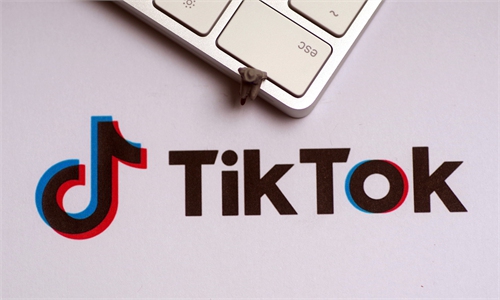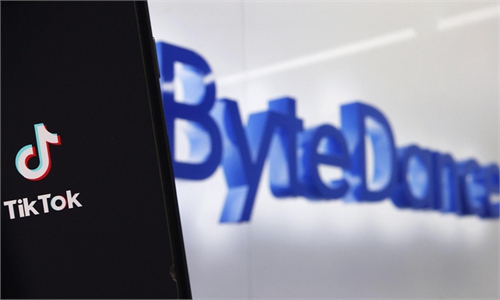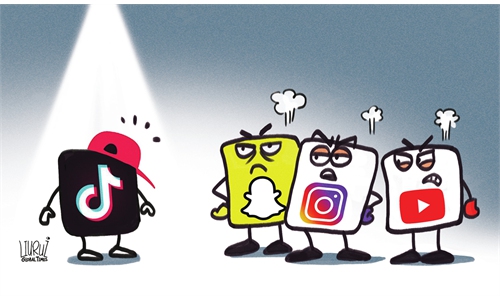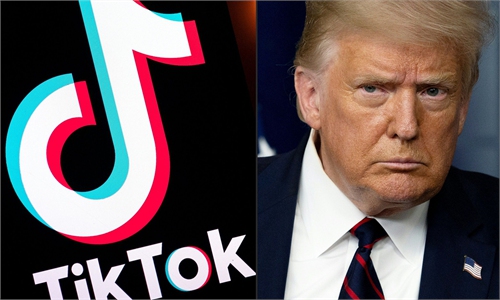 |
Washington robs TikTok by treading upon rules |
 |
| TikTok for Business: What is TikTok Anyway? |
Countries mull reducing reliance on US tech in wake of TikTok drama
As the US shocked the free world with its mafia-style forced sale of Chinese-owned short-form video platform TikTok, Chinese
experts said that US extortion and looting have left a deep impression on the minds of the nations of the world, and pointed out that many of the countries are already striving to boost self-reliance in terms of
security, industrial independence and technological ownership.
Expert slams US president’s move to get a cut from TikTok as an ‘extortion threat’ and ‘mafia deal’.
https://youtu.be/cOgQnIJJRZs
https://youtu.be/j7Zi1CCtQIQ
https://youtu.be/j7Zi1CCtQIQ
| Controversial: Trump has said he would approve TikTok’s sale to Microsoft only if the US government gets a cut from the deal. — Reuters |
TikTok's roller-coaster ride in the United States continued on Monday as President Donald Trump said he would approve the video-sharing app's sale to Microsoft only if the US government gets a cut, a condition that one expert called a "mafia" deal.
The president also gave Microsoft and TikTok's Chinese owner, ByteDance, a deadline of Sept 15 to complete the deal, or the app will be banned in the US.
Foreign Ministry spokesman Wang Wenbin said at a regular media briefing in Beijing on Tuesday that the US treatment of TikTok is "outright bullying", and the US only uses a "national security risk" as an excuse to suppress Chinese tech enterprises.
"The relevant enterprises carry out business activities in the US following market principles and international rules and abiding by local laws and regulations," he said. "However, the US has set restrictions and suppressed them with unwarranted charges, which is political manipulation."
Wang said that if the wrongdoing by the US continues, then any country could take similar measures against any American enterprise on the grounds of national security.
"The US side must not open this Pandora's box, otherwise it will suffer its consequences," he said.
The increased scrutiny of TikTok culminated on Friday when Trump threatened to ban the app from operating in the US due to a "national security risk". The negotiations between the two companies were then halted.
But after a weekend phone call with Microsoft CEO Satya Nadella, Trump reversed his stance and reportedly gave the two companies 45 days to close the deal. This was confirmed by Microsoft on Sunday, which said in a statement it "will move quickly to pursue discussions" with ByteDance and complete the talks "no later than" Sept 15.
The president added a condition to the potential purchase on Monday: Microsoft should buy TikTok outright, and the US Treasury Department should be paid because the government made the deal possible.
"It's a little bit like the landlord/tenant; without a lease the tenant has nothing, so they pay what's called 'key money', or they pay something," Trump told reporters in the Cabinet Room at the White House on Monday. "But the United States should be reimbursed or should be paid a substantial amount of money, because, without the United States, they don't have anything."
Investors in privately owned Byte-Dance valued TikTok at $50 billion, according to a Reuters report.
Kai-Fu Lee, former chairman of Google China, said the US treatment of TikTok, including "forced acquisition, plus only 45 days, plus finder's fees", is "incredible".
Lee said that China has set clear rules for internet companies that want to operate in the country, and Google had decided to exit as it didn't want to comply with Chinese laws and regulations.
"The US didn't give any parameters that TikTok could work with, and didn't provide any evidence for their claims that TikTok had caused national security risks to the US," he said.
The legal basis of Trump's requirement that some of the money from the deal go to the US Treasury was immediately questioned by experts.
"This is quite unusual; this is out of the norm," Gene Kimmelman, a former chief counsel for the US Department of Justice's Antitrust Division, told CNN.
"It's actually quite hard to understand what the president is actually talking about here.... It's not unheard of for transactions to have broader geopolitical implications between countries, but it's quite remarkable to think about some kind of money being on the table in connection with a transaction," said Kimmelman, a senior adviser to the policy group Public Knowledge.
Julian Sanchez, a senior fellow at the Cato Institute, a think tank based in Washington, D.C., said Trump's "extortion threat" is a "mafia business model".
"Trump's full explanation of why the Treasury should get a 'cut' of a Microsoft/TikTok deal is, somehow, even more grotesque and shameless than I had anticipated," said Sanchez.
"As with his tariff policy, there doesn't seem to be any consideration of whether this sets a dangerous precedent for other countries to engage in similar pretextual protectionism against us, or how whimsically compelling divestment might affect international investment," he said.
Samm Sacks, a senior fellow at Yale Law School's Paul Tsai China Center, also warned that shutting down the app altogether would set "a dangerous precedent in which the US government can blacklist companies based on country of origin using blanket national security as justification".
The Trump administration has been scrutinizing TikTok for several months, claiming that the platform shares the data of US users with the Chinese government. The company has repeatedly denied the accusations, maintaining that all the users' information is stored in the US.
Source link
Related:
While China is busy innovating, the US is guarding
against an innovative China. This twisted behavior has prevented the US
from continuing to innovate and reform. The dominant position it
acquired, or its hegemony, is becoming a self-inflicted fetter for its
progress.
The president also gave Microsoft and TikTok's Chinese owner, ByteDance, a deadline of Sept 15 to complete the deal, or the app will be banned in the US.
Foreign Ministry spokesman Wang Wenbin said at a regular media briefing in Beijing on Tuesday that the US treatment of TikTok is "outright bullying", and the US only uses a "national security risk" as an excuse to suppress Chinese tech enterprises.
"The relevant enterprises carry out business activities in the US following market principles and international rules and abiding by local laws and regulations," he said. "However, the US has set restrictions and suppressed them with unwarranted charges, which is political manipulation."
Wang said that if the wrongdoing by the US continues, then any country could take similar measures against any American enterprise on the grounds of national security.
"The US side must not open this Pandora's box, otherwise it will suffer its consequences," he said.
The increased scrutiny of TikTok culminated on Friday when Trump threatened to ban the app from operating in the US due to a "national security risk". The negotiations between the two companies were then halted.
But after a weekend phone call with Microsoft CEO Satya Nadella, Trump reversed his stance and reportedly gave the two companies 45 days to close the deal. This was confirmed by Microsoft on Sunday, which said in a statement it "will move quickly to pursue discussions" with ByteDance and complete the talks "no later than" Sept 15.
The president added a condition to the potential purchase on Monday: Microsoft should buy TikTok outright, and the US Treasury Department should be paid because the government made the deal possible.
"It's a little bit like the landlord/tenant; without a lease the tenant has nothing, so they pay what's called 'key money', or they pay something," Trump told reporters in the Cabinet Room at the White House on Monday. "But the United States should be reimbursed or should be paid a substantial amount of money, because, without the United States, they don't have anything."
Investors in privately owned Byte-Dance valued TikTok at $50 billion, according to a Reuters report.
Kai-Fu Lee, former chairman of Google China, said the US treatment of TikTok, including "forced acquisition, plus only 45 days, plus finder's fees", is "incredible".
Lee said that China has set clear rules for internet companies that want to operate in the country, and Google had decided to exit as it didn't want to comply with Chinese laws and regulations.
"The US didn't give any parameters that TikTok could work with, and didn't provide any evidence for their claims that TikTok had caused national security risks to the US," he said.
The legal basis of Trump's requirement that some of the money from the deal go to the US Treasury was immediately questioned by experts.
"This is quite unusual; this is out of the norm," Gene Kimmelman, a former chief counsel for the US Department of Justice's Antitrust Division, told CNN.
"It's actually quite hard to understand what the president is actually talking about here.... It's not unheard of for transactions to have broader geopolitical implications between countries, but it's quite remarkable to think about some kind of money being on the table in connection with a transaction," said Kimmelman, a senior adviser to the policy group Public Knowledge.
Julian Sanchez, a senior fellow at the Cato Institute, a think tank based in Washington, D.C., said Trump's "extortion threat" is a "mafia business model".
"Trump's full explanation of why the Treasury should get a 'cut' of a Microsoft/TikTok deal is, somehow, even more grotesque and shameless than I had anticipated," said Sanchez.
"As with his tariff policy, there doesn't seem to be any consideration of whether this sets a dangerous precedent for other countries to engage in similar pretextual protectionism against us, or how whimsically compelling divestment might affect international investment," he said.
Samm Sacks, a senior fellow at Yale Law School's Paul Tsai China Center, also warned that shutting down the app altogether would set "a dangerous precedent in which the US government can blacklist companies based on country of origin using blanket national security as justification".
The Trump administration has been scrutinizing TikTok for several months, claiming that the platform shares the data of US users with the Chinese government. The company has repeatedly denied the accusations, maintaining that all the users' information is stored in the US.
Source link
Related:
 US degrades from innovator to digital rogue
US degrades from innovator to digital rogue
While China is busy innovating, the US is guarding
against an innovative China. This twisted behavior has prevented the US
from continuing to innovate and reform. The dominant position it
acquired, or its hegemony, is becoming a self-inflicted fetter for its
progress.
Hard to say who will surprise you in the future, US or TikTok
In addition to power, there exist rules and morals in this world. Although Trump's power can overwhelm rules and ethics, he has only fewer than three months left before the presidential election. People have a subtle perception of rules and ethics in their minds. Trump could thus lose votes due to any most slightly careless move.
TikTok ban demonstrates barbaric act of rogue US: Global Times editorial
In the most barbaric way, the US is trying to solidify a high-tech world order in which it is the absolute center. Whether it ends up "killing" TikTok or forcibly taking the child out of Bytedance's arms, it is one of the ugliest scenes of the 21st century in the high-tech competitionTrump wants to kill TikTok
We are not the enemy: TikTok chief
https://youtu.be/4bS5ukQGa_Y
TikTok users take on Trump
https://youtu.be/Jo6LHELhhnM
Related posts:
US adopts blinkered view of TikTok

Unknown Chinese startup creates the world's most valuable Bytedance








